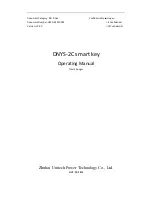
311020
9
Troubleshooting
PROBLEM
CAUSE
SOLUTION
Pump output is low
Strainer (34f) is clogged
Clean strainer.
Piston ball is not seating
Service piston ball. See pump manual.
Piston packings are worn or damaged
Replace packings. See pump manual.
O-ring in pump is worn or damaged
Replace o-ring. See pump manual.
Intake valve ball is not seating properly
Clean intake valve. See pump manual.
Intake valve ball is packed with material
Clean intake valve. See pump manual.
Engine speed is too low
Increase throttle setting. See operation manual.
Clutch is worn or damaged
Replace clutch. Page 13.
Pressure setting is too low
Increase pressure. See operation manual.
Fluid filter (11), tip filter or tip is clogged or dirty
Clean filter. See operation or spray gun manu-
al.
Large pressure drop in hose with heavy
materials
Use larger diameter hose and/or reduce overall
length of hose. Use of more than 100 ft of 1/4
in. hose significantly reduces performance of
sprayer. Use 3/8 in. hose for optimum perfor-
mance (50 ft minimum).
Excessive paint leakage into
throat packing nut
Throat packing nut is loose
Remove throat packing nut spacer. Tighten
throat packing nut just enough to stop leakage.
Throat packings are worn or damaged
Replace packings. See pump manual.
Displacement rod is worn or damaged
Replace rod. See pump manual.
Fluid is spitting from gun
Air in pump or hose
Check and tighten all fluid connections.
Reprime pump. See operation manual.
Tip is partially clogged
Clear tip. See spray gun manual.
Fluid supply is low or empty
Refill fluid supply. Prime pump. See operation
manual. Check fluid supply often to prevent
running pump dry.
Pump is difficult to prime
Air in pump or hose
Check and tighten all fluid connections.
Reduce engine speed and cycle pump as
slowly as possible during priming.
Intake valve is leaking
Clean intake valve. Be sure ball seat is not
nicked or worn and that ball seats well. Reas-
semble valve.
Pump packings are worn
Replace pump packings. See pump manual.
Paint is too thick
Thin the paint according to the supplier’s
recommendations
Engine speed is too high
Decrease throttle setting before priming pump.
See operation manual.
Clutch squeaks each time
clutch engages
Clutch surfaces are not matched to each other
when new and may cause noise
Clutch surfaces need to wear into each other.
Noise will dissipate after a day of run time.
High engine speed at no
load
Misadjusted throttle setting
Reset throttle to 3600 engine rpm at no load
load
Worn engine governor
Replace or service engine governor










































